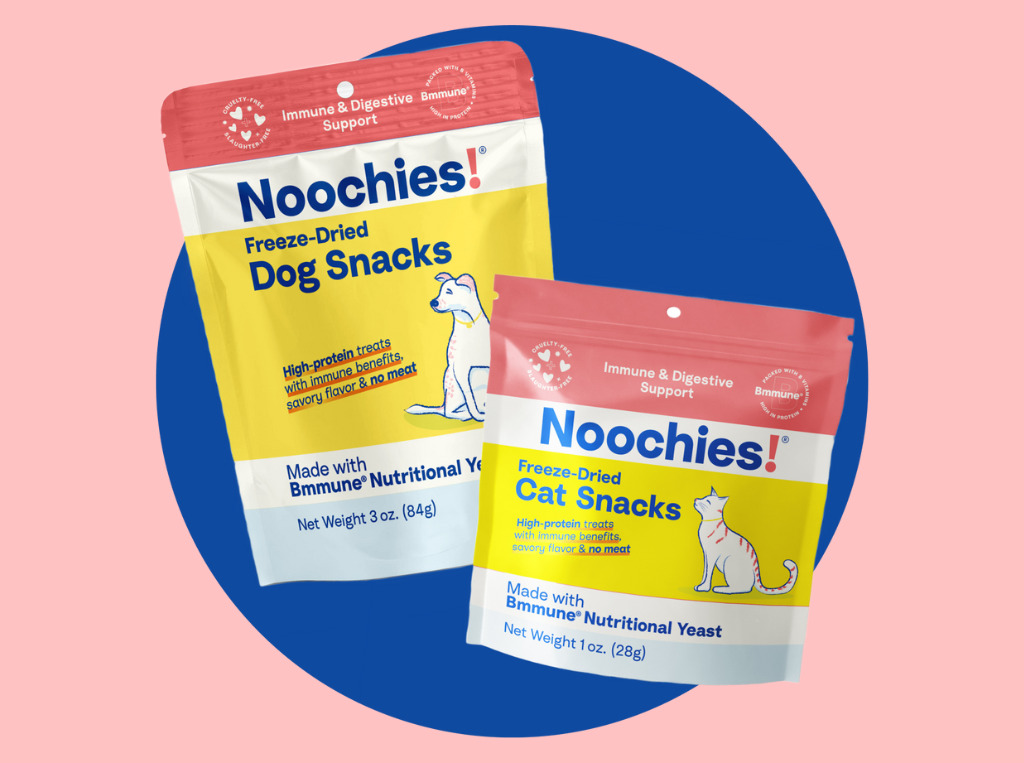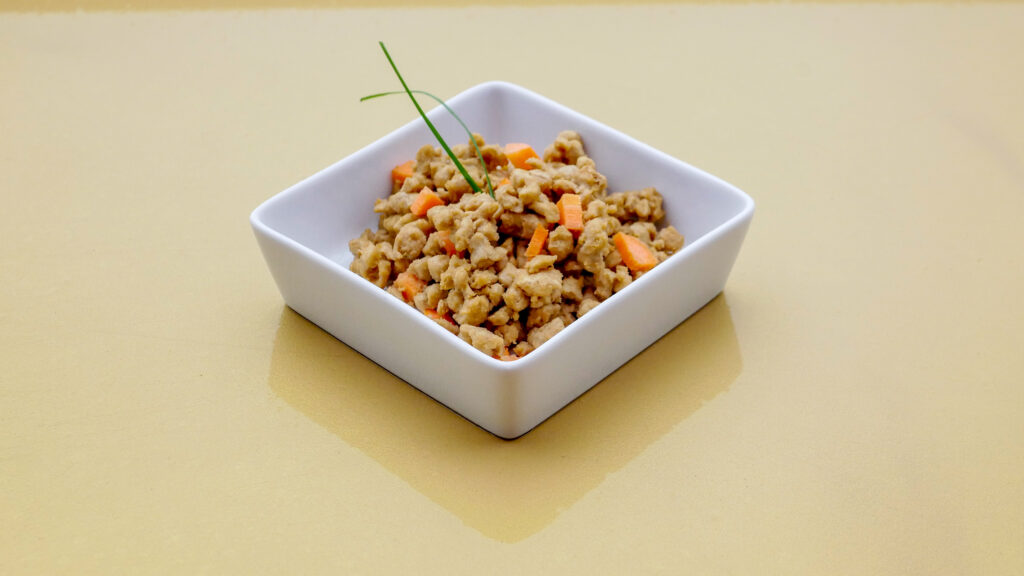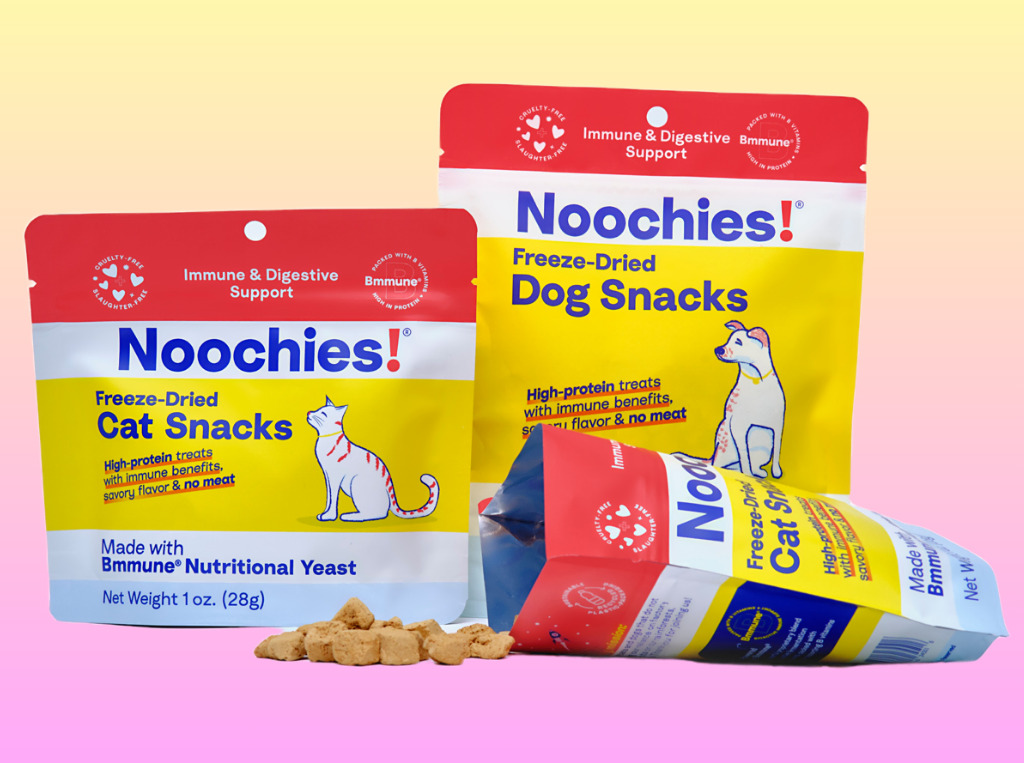4 Mins Read
Canadian alt-protein platform Cult Food Science has launched vegan cat treats under its sub-brand Noochies. The new product uses the company’s patented Bmmune nutritional yeast ingredient.
Cult Food Science’s new plant-based cat treats are freeze-dried and said to have “an amino acid profile similar to cuts of chicken or lamb”, alongside “high levels of protein and dietary fibre, and some great B vitamin content”, according to Noochies founder Joshua Errett, who is the VP of product development at Cult Food Science.
Errett claims the product is “first to market” in this segment in North America. He added: “I don’t believe there is a healthier cat snack in the world today.” In addition, Noochies says it uses post-consumer recycled packaging and carbon-neutral shipping for the product.
The cat treats are made with Cult Food Science’s patented Bmmune ingredient, which is a blend of nutritional yeast and fermented fungi – Errett confirmed to Green Queen that Bmmune is a cultivated yeast, as opposed to a wild or Brewer’s yeast, but there’s no cultivated meat in the treats. The ingredient is rich in postbiotic material and polyphenols, which have been found to fight inflammation, rebalance cats’ intestinal health, reduce oxidative stress and even decrease cancer-related bacteria activity.
Noochies’ brand history

Noochies was previously a brand asset of BioCraft Pet Nutrition (formerly Because Animals), which was co-founded by Errett and CEO Shannon Falconer. Subsequently, Errett left the company in September 2022 and joined Cult Food Science as VP of product development in October.
Earlier this year, Falconer said BioCraft Pet Nutrition aimed to focus on the commercialisation of its cultivated meat tech, having discontinued its nutritional-yeast-based products last year and agreed to sell “all formulations” of these products to Errett, who acquired Noochies.
“Because Animals retains all of its intellectual property relating to cultured meat – which is our core business – and we are committed to revolutionising the pet food industry with this technology,” said Falconer. Earlier this month, the company unveiled an AI and machine learning tool to accelerate R&D and identify cheaper inputs and ingredients, as well as those less likely to raise regulatory concerns – a big step for cultured meat companies.
Alt-protein for pets

Noochies isn’t the only Cult brand working on alternative pet food. In August, it partnered with Singapore-based cultured seafood producer Umami Bioworks to unveil Marina Cat, a cultivated pet food brand. It will combine Umami’s cell-cultured red ocean snapper and Cult’s Bmmune ingredient, with aims to begin production later this year, and have a widespread launch in 2024.
“My vision for the future is that we no longer have to slaughter other animals to feed our cats,” Errett said at the time. “This brand brings me one very great step closer to making that a reality.” Other brands working in the cell-based pet food space include Bond Pet Food, which created cultured chicken for pets in 2020, and Wild Earth, which developed a cultivated chicken broth topper for dogs last year.
Wild Earth makes vegan pet food too, a category that features brands like Omni, The Pack, V-Dog, Hownd and Benevo as well, among others. Research has shown that if all the world’s dogs and cats went vegan, it would help feed nearly 520 million people, conserve land the size of multiple countries, and save billions of animals from slaughter. Studies have also eased consumer concerns about the health benefits of vegan food for cats, who have always been known as obligate carnivores.
Last month, a survey of 1,369 cat owners found that cats on a plant-based diet could be healthier than those fed meat, with owners reporting fewer visits to the vet, reduced medication use and assessments of severe illness, and more vets describing vegan cats as healthy – though only 127 cats were on a vegan diet in the study, which is a small sample size.
In 2021, a similar study of 1,026 cats found that 18% of felines (187) who were fed plant-based diets were more frequently reported by guardians to be in very good health. This is translating to consumers too: in the UK, a 2022 survey by The Vegan Society revealed that 40% of owners who feed their cats a plant-based diet do so because they believe it’s healthier.
As for Noochies, which has worked with cultivated proteins previously, Errett says: “I’m mission-driven, for animals and the environment, so everything I do is going to be vegan – until I can get regulatory approval on cell-cultivated meats.”



